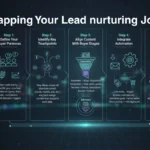In digital marketing, data can tell you what your leads do but psychology explains why they do it. The psychology of lead nurturing is about understanding what motivates people to engage, trust, and eventually buy.
Lead nurturing is not about bombarding leads with messages or offers but about creating an emotional connection that grows stronger with every interaction.
By combining behavioral science with empathy, you can turn every campaign into a meaningful conversation rather than a sales push.
Why Trust Is the Currency of Modern Marketing
Modern consumers don’t just buy products; they buy confidence. In a noisy marketplace filled with ads, offers, and automation, trust has become the single most valuable differentiator.
“Trust is earned in drops and lost in buckets.”
The psychology of lead nurturing starts with credibility. Leads must believe you understand their needs before they’ll consider your solutions.
According to Edelman’s Trust Barometer, 81% of consumers say trust is a deciding factor in their purchase decisions. Without it, even the most advanced nurturing systems fall flat.
Trust converts browsers into buyers and buyers into loyal advocates.
The Emotional Core of Lead Nurturing
Behind every click and conversion lies emotion. The psychology of lead nurturing uses emotion as a bridge between awareness and decision-making.
The Four Emotions That Drive Engagement
- Curiosity : Sparks initial interest through storytelling or educational content.
- Confidence : Grows when your brand consistently delivers value and relevance.
- Comfort : Builds through personalization and familiarity.
- Commitment : Happens when trust transitions into loyalty.
When these emotions are nurtured over time, they create what psychologists call the “mere exposure effect”, the more people encounter your brand positively, the more they trust and prefer it.
“Emotionally connected customers are 52% more valuable than satisfied ones.”
The 3Ts of Psychological Nurturing: Timing, Trust, and Transparency
The foundation of the psychology of lead nurturing can be summarized into three principles, the 3Ts:
1. Timing: When You Show Up Matters as Much as What You Say
Relevance is perishable. Send the right message too soon or too late, and it misses the mark. Smart nurturing maps timing to behavior and not just the calendar.
2. Trust: The Power of Consistency
Consistency across content, tone, and delivery creates predictability. Predictability breeds safety and safety builds trust.
3. Transparency: The Ultimate Trust Builder
Modern leads are privacy-aware. They value honesty about data usage, pricing, and process. Being transparent builds more emotional equity than overpromising ever could.
How Cognitive Biases Shape Lead Nurturing
The psychology of lead nurturing taps into powerful subconscious patterns known as cognitive biases that influence decision-making.
1. Reciprocity Bias
People naturally feel compelled to return a favor. Offer valuable content, and they’ll feel inclined to reciprocate with engagement or action.
2. Social Proof Bias
When people see others trusting or buying from you, their risk perception drops. Add testimonials, case studies, and UGC to your nurturing flow.
3. Authority Bias
Leads are more likely to trust a brand that demonstrates expertise. Share insights, not just opinions and back them with data or credible results.
4. Loss Aversion Bias
Humans fear loss more than they desire gain. Ethically use scarcity or limited-time offers to motivate timely decisions.
5. Commitment-Consistency Bias
Once people take a small action (like subscribing), they’re more likely to continue engaging. Design your nurturing flow to encourage small commitments early.
Storytelling: The Emotional Engine of Lead Nurturing
Facts tell, but stories sell because stories bypass logic and connect directly with emotion.
In the psychology of lead nurturing, storytelling helps leads visualize transformation. It shifts focus from what you sell to what they gain.
Crafting Stories That Nurture
- Make the customer the hero, not your brand.
- Use tension (problem → solution → outcome).
- Reinforce emotional triggers like belonging, success, or relief.
- Close with a credible proof point or testimonial.
A well-told story turns abstract marketing into memorable meaning and meaning drives trust.
“Stories make your brand relatable. Logic closes sales; emotion opens doors.”
The Role of Personalization in Psychological Nurturing
Personalization is no longer just segmentation but it also includes emotional relevance.
The psychology of lead nurturing emphasizes personalization because humans crave recognition. They want to feel seen, understood, and valued.
Smart Personalization in Practice
- Reference past interactions or downloads.
- Address specific pain points instead of generic benefits.
- Use adaptive content blocks in email or web flows.
When leads feel you “get them,” resistance melts away. Personalized nurturing makes marketing feel like a conversation and not a campaign.
Emotional Momentum: The Silent Conversion Driver
Every nurturing sequence has emotional rhythm with curiosity leads to comfort, comfort to confidence, confidence to conversion.
If this rhythm breaks (e.g., inconsistent communication or irrelevant messages), momentum stalls.
To maintain emotional flow:
- Keep consistent touchpoints without overwhelming.
- Match content tone with the buyer’s stage.
- Reward micro-engagements (downloads, replies, clicks).
Emotional momentum builds anticipation and keeps your brand “mentally available” when buying decisions happen.
Measuring the Psychology of Lead Nurturing
Quantifying emotion sounds abstract, but it’s possible through behavior analytics.
Key Psychological Metrics
- Engagement Depth: Tracks how long and how often leads interact.
- Response Intent: Measures tone in replies, comments, or chat interactions.
- Conversion Velocity: Reveals how quickly emotionally engaged leads move through the funnel.
Combining these with standard metrics (open rates, CTRs) helps you visualize emotional ROI and how effectively your messaging builds trust and connection.
How AI Is Enhancing Psychological Nurturing
AI is revolutionizing how we understand human behavior. Today, algorithms can interpret tone, predict engagement, and recommend personalized nurturing actions.
For example:
- Sentiment analysis in emails can gauge mood.
- Predictive models forecast drop-off risk.
- Smart CRM tags segment leads based on engagement psychology.
The future of psychology of lead nurturing will merge data with emotion and science with storytelling.
“AI decodes behavior; marketers must decode emotion.”
Common Psychological Mistakes in Nurturing
Even skilled marketers can lose emotional balance. Avoid these pitfalls:
- Over-Personalization: Feels invasive rather than caring.
- Over-Automation: Breaks human connection.
- Fear-Based Tactics: Manipulate instead of motivating.
- Ignoring Feedback: Every lead response reveals emotional insight.
Authenticity always outperforms automation alone.
Bringing It All Together
The psychology of lead nurturing is the art of aligning empathy with automation. When you understand what drives your audience emotionally, your messages resonate, your brand feels human, and your conversions rise naturally.
Lead nurturing isn’t about algorithms only, it’s also about emotions, trust, and timing.
“Technology delivers messages. Psychology delivers meaning.”













